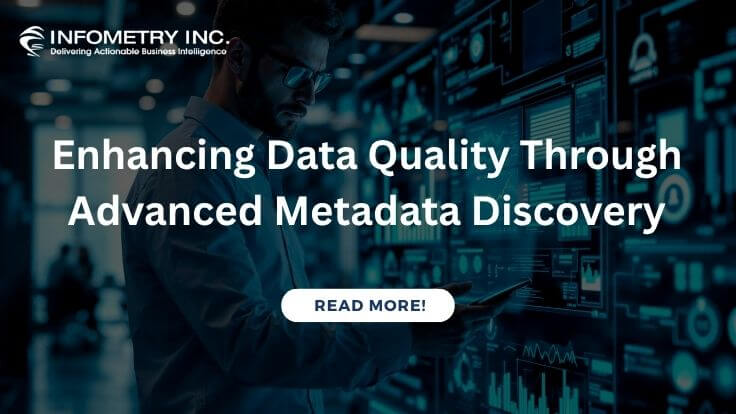
Top Reasons to Try and Buy Snowflake Native Apps on Snowflake Marketplace
April 2, 2024
Data Analytics Trends 2024 & Beyond
April 15, 2024In today’s data-driven business landscape, organizations are continually seeking ways to gain a competitive edge. Advanced analytics has emerged as a powerful tool that allows businesses to extract valuable insights from large and complex datasets. In this blog, we will explore what advanced analytics is, its key components, and how businesses can effectively leverage it to make informed decisions and drive success.
Understanding Advanced Analytics:
Advanced analytics refers to the use of sophisticated techniques and tools to analyze and interpret data, uncover patterns, and generate actionable insights. Unlike traditional analytics, which often focuses on historical data, advanced analytics explores predictive and prescriptive analytics, enabling businesses to anticipate future trends and make strategic decisions.
Key Components of Advanced Analytics:
Descriptive Analytics:
Descriptive analytics involves examining historical data to understand what has happened in the past. It includes the use of data visualization tools, dashboards, and reports to present a clear picture of trends and patterns.
Predictive Analytics:
Predictive analytics leverages statistical algorithms and machine learning models to forecast future outcomes. By analyzing historical data and identifying patterns, businesses can make informed predictions about customer behavior, market trends, and other variables.
Prescriptive Analytics:
Prescriptive analytics takes data analysis to the next level by providing actionable recommendations. It not only predicts what might happen but also suggests the best course of action to achieve desired outcomes. This component helps businesses optimize decision-making processes.
Machine Learning:
Machine learning algorithms play a crucial role in advanced analytics, enabling computers to learn from data and improve their performance over time. These algorithms can be applied to various business processes, such as customer segmentation, fraud detection, and demand forecasting.
The Importance of Advanced Analytics for Business
Embracing Advanced Analytics signifies a transformative step for any business, offering the ability to harness reliable insights seamlessly integrated into the decision-making process. The implementation of Advanced Analytics not only facilitates user empowerment and adoption but also fosters a more intelligent perspective. Let’s delve into the compelling reasons why businesses should seriously consider adopting this methodology.
Supporting Day-to-Day Decisions:
Advanced Analytics tools play a pivotal role in providing genuine insights to guide daily decision-making. These tools empower businesses to discern the most effective next steps and navigate specific actions with clarity.
Providing Clarity and Analysis:
In a world where neglecting data can lead to navigating blindly amidst countless options, Advanced Analytics offers a consistent and clear perspective. Utilizing data properly through these tools ensures businesses avoid getting lost in the complexities and uncertainties.
Enhancing Agility and Time Efficiency:
The innate capability of Advanced Analytics tools to interpret data facilitates improved agility and time savings. Businesses gain the foresight to discern when to pivot, explore new avenues, refine existing approaches, or leverage proven methodologies, ensuring a naturally adaptive and efficient decision-making process.
In essence, an advanced analytics solution emerges as the ideal choice for organizations seeking maximum results, swift adaptability, and efficient asset organization. Considering the projected growth of the global advanced analytics market to reach $281.0 billion by 2024, leveraging these tools presents a significant opportunity for organizations to enhance their operations. Exploring the numerous benefits of Advanced Analytics becomes imperative in light of this growth, setting the stage for organizations to optimize their decision-making processes and thrive in an evolving business landscape.
How to Use Advanced Analytics for Your Business?
Define Clear Objectives:
Before diving into advanced analytics, businesses should define clear objectives and identify the specific problems they aim to solve. Whether it’s improving customer retention, optimizing supply chain management, or enhancing marketing strategies, having well-defined goals is crucial.
Data Quality and Integration:
High-quality data is the foundation of effective advanced analytics. Ensure that your data is accurate, complete, and well-integrated from various sources. Investing in data governance practices and data quality tools can significantly impact the success of your analytics initiatives.
Choose the Right Tools and Technologies:
Selecting the right analytics tools and technologies is essential. There are various platforms available that cater to different business needs. Cloud-based solutions, open-source tools, and specialized analytics software can all contribute to a robust analytics infrastructure.
Invest in Skilled Personnel:
Building a team with expertise in data science, machine learning, and analytics is crucial. Skilled personnel can develop, implement, and interpret advanced analytics models effectively. Training existing employees or hiring specialists can be a strategic investment.
Iterative and Agile Approach:
Advanced analytics is not a one-time effort; it requires an iterative and agile approach. Regularly revisit and update models as new data becomes available, and business conditions evolve. This ensures that analytics solutions remain relevant and provide ongoing value.
Data Security and Privacy:
As businesses handle increasingly sensitive data, prioritizing data security and privacy is paramount. Implement robust security measures and adhere to data protection regulations to build trust with customers and stakeholders.
Measure and Monitor Results:
Implement key performance indicators (KPIs) to measure the success of your advanced analytics initiatives. Regularly monitor and evaluate the impact of analytics on business outcomes, and be prepared to adjust strategies based on the results.
Benefits of Advanced Analytics
Advanced analytics offers a multitude of benefits to businesses, empowering them to extract meaningful insights, make informed decisions, and gain a competitive edge in today’s data-driven landscape.
Here are some key advantages of incorporating advanced analytics into your business strategy:
Data-Driven Decision-Making:
Advanced analytics allows organizations to base their decisions on data-driven insights rather than relying solely on intuition or past experiences. This results in more informed, strategic decision-making, leading to better outcomes and increased operational efficiency.
Predictive Analysis for Future Trends:
One of the standout features of advanced analytics is its ability to predict future trends. By leveraging predictive analytics models, businesses can anticipate market shifts, customer preferences, and potential challenges, enabling proactive planning and adaptation.
Improved Customer Understanding and Personalization:
Advanced analytics helps businesses gain a deeper understanding of their customers. By analyzing customer data, organizations can create detailed profiles, identify preferences, and personalize interactions, leading to enhanced customer satisfaction and loyalty.
Optimized Operational Efficiency:
Businesses can streamline their operations and improve efficiency by leveraging advanced analytics. Through the identification of bottlenecks, inefficiencies, and optimization opportunities, organizations can enhance workflows, reduce costs, and maximize productivity.
Enhanced Marketing Strategies:
Advanced analytics enables more targeted and effective marketing strategies. By analyzing customer behaviour, preferences, and response patterns, businesses can tailor marketing campaigns for specific demographics, resulting in improved engagement and higher conversion rates.
Risk Management and Fraud Detection:
Organizations can mitigate risks and enhance security measures through advanced analytics. Predictive modelling and anomaly detection help identify potential threats, enabling businesses to implement proactive measures and detect fraudulent activities more effectively.
Supply Chain Optimization:
Advanced analytics plays a crucial role in optimizing supply chain management. Businesses can better forecast demand, manage inventory more efficiently, and improve overall supply chain visibility, leading to cost savings and improved delivery performance.
Continuous Improvement and Innovation:
The iterative nature of advanced analytics promotes a culture of continuous improvement. By regularly analyzing data, refining models, and adapting strategies, businesses can stay ahead of the competition and foster a culture of innovation.
Real-Time Insights:
Advanced analytics allows organizations to access real-time insights into their operations. This capability is particularly valuable in dynamic environments, enabling timely decision-making and rapid response to changing market conditions.
Cost Savings and Resource Optimization:
Through the identification of cost-saving opportunities and the efficient allocation of resources, advanced analytics contributes to overall financial optimization. This ensures that organizations maximize their return on investment and allocate resources strategically.
The Role of Infometry:
Infometry stands out as a key player in the realm of advanced analytics, offering a range of services and solutions that help organizations harness the full potential of their data. Let’s delve into the specific roles and contributions of Infometry in enabling business excellence through advanced analytics:
Data Integration and Management:
Infometry specializes in seamlessly integrating disparate data sources, ensuring that organizations have a unified view of their data. This is a crucial first step in the analytics journey, as it lays the foundation for accurate and comprehensive analysis.
Advanced Analytics Platforms:
Infometry provides state-of-the-art analytics platforms that leverage machine learning and artificial intelligence to generate actionable insights. These platforms enable businesses to uncover patterns, trends, and correlations within their data, facilitating informed decision-making.
Predictive Analytics:
One of the key strengths of Infometry is its expertise in predictive analytics. By employing advanced statistical algorithms, Infometry helps businesses forecast future trends, identify potential risks, and optimize various aspects of their operations.
Real-time Analytics:
In the fast-paced business environment, real-time insights are invaluable. Infometry’s solutions are designed to provide organizations with up-to-the-minute analytics, allowing for quick response to market changes and emerging opportunities.
Customized Solutions:
Infometry understands that each business is unique, and a one-size-fits-all approach doesn’t work. The company excels in creating customized analytics solutions tailored to the specific needs and goals of its clients, ensuring maximum relevance and impact.
Conclusion:
In the era of data-driven decision-making, harnessing the power of advanced analytics is no longer a luxury but a necessity for business excellence. Infometry’s role in this landscape is pivotal, providing organizations with the tools and expertise needed to extract actionable insights from their data. As businesses continue to navigate a complex and dynamic market, having a partner like Infometry can be the key to staying ahead of the competition and achieving sustained success in the long run.





